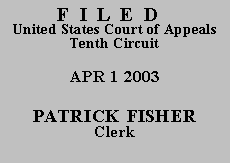

| UNITED STATES OF AMERICA,
Plaintiff-Appellee, Defendant-Appelllant. |
No. 02-2157
(D.C. No. CIV-01-1215) |
The district court consolidated the petitions of Mr. Singleton and his co-conspirators, and referred them to a magistrate judge. On March 27, 2002, the magistrate judge issued findings and a recommendation denying the parties' claims for relief. The magistrate's report specifically indicated that pursuant to 28 U.S.C. § 636(b)(1), the parties had ten days upon receiving the report to file written objections with the district court, and that failure to do so would bar their ability to seek appellate review of the court's findings and recommendations. Mr. Singleton did not submit written objections to the district court until May 17, 2002, long after the ten day filing period had expired, so they were stricken as untimely.(3) Mr. Singleton nonetheless brings this appeal, challenging the district court's denial of his § 2255 petition.
Mr. Singleton is precluded from appealing the district court's order under this circuit's firm waiver rule, which holds that a party's failure to timely object to a magistrate judge's report and recommendation bars the party from seeking appellate review of the district court's order. See Talley v. Hesse, 91 F.3d 1411, 1412-13 (10th Cir. 1996); Moore v. United States, 950 F.2d 656, 659 (10th Cir. 1991). We do make exceptions to the firm waiver rule "where the interests of justice so require," Fottler v. United States, 73 F.3d 1064, 1065 (10th Cir. 1996), or where "the magistrate's order does not clearly apprise a pro se litigant of the consequences of a failure to object." Talley, 91 F.3d at 1413. However, this is not such a case. The magistrate judge's report clearly told Mr. Singleton he had ten days in which to file his objections or waive his right to appeal. Mr. Singleton failed to file his written objections within the time allotted by statute, or even within the extended time granted to his co-conspirator. Moreover, Mr. Singleton has failed to present any argument indicating the interests of justice require us to address his claims.
Accordingly, we DENY Mr. Singleton's request for a COA.(4)
ENTERED FOR THE COURT
Stephanie K. Seymour
Circuit Judge
*.After examining appellant's brief and the appellate record, this panel has determined unanimously that oral argument would not materially assist the determination of this appeal. See Fed. R. App. P. 34(a)(2) and 10th Cir. R. 34.1(G). The case is therefore submitted without oral argument.
1.Mr. Singleton's request to withdraw his plea was denied by the district court and affirmed on appeal. See United States v. Hernandez, 216 F.3d 1088 (10th Cir. 2000) (unpub. op.).
2.Mr. Singleton did not specifically list this last claim in his § 2255 petition. Nonetheless, the magistrate judge addressed the claim noting that Mr. Singleton's supporting brief, a document not included in the record on appeal, contained arguments regarding the search and seizure issue.
3.Samuel J. Singleton, one of Mr. Singleton's co-conspirators, filed written objections with the court after receiving an extension to May 10, 2002. Petitioner Clarence Singleton's objections were not only filed beyond the time granted to Samuel Singleton, they were filed after the district court adopted the magistrate judge's report on May 13, 2002.
4.In light of our denial of a COA, we need not address Mr. Singleton's motions to file supplemental and reply briefs, or his motion to adopt Samuel J. Singleton's brief regarding the government's search of his jail cell.